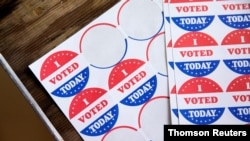FBI Director Christopher Wray on Thursday warned lawmakers that Russia is not letting up in its efforts to sway the outcome of the November presidential election by trying to hurt the campaign of Democratic candidate and former Vice President Joe Biden – testimony that appears not to be sitting well with U.S. President Donald Trump.
Wray, testifying before the House Homeland Security Committee, described the Kremlin’s influence operations as “very, very active” on social media, on its own state-run media and through various proxies.
The aim of these influence operations is “primarily to denigrate Vice President Biden and what the Russians see as kind of an anti-Russian establishment," he said.
Wray’s public appraisal of the stepped-up Russian influence operations is his first since the U.S. presidential campaign entered its final stretch. It is also in line with a rare public assessment offered in early August by the nation’s top counterintelligence official, William Evanina.
Evanina, though, also warned Russian-linked actors were “seeking to boost” Trump’s candidacy, something the FBI’s Wray did not say when asked about Russian meddling.
Trump, who has been known to take top intelligence and law enforcement officials to task on social media, responded late Thursday, calling the FBI director by his first name.
“But Chris, you don’t see any activity from China, even though it is a FAR greater threat than Russia, Russia, Russia,” Trump wrote, adding “They will both, plus others, be able to interfere in our 2020 Election with our totally vulnerable Unsolicited (Counterfeit?) Ballot Scam. Check it out!”
Despite the president’s allegations about mail-in ballots, allegations he has raised repeatedly, the FBI director told lawmakers just hours earlier such concerns were baseless.
"We have not seen, to date, a coordinated national voter fraud effort in a major election," Wray said, echoing assurances given by senior U.S. law enforcement and intelligence officials who spoke to reporters on the condition of anonymity just last month.
Instead, Wray said, his fears have centered on the barrage of disinformation, from Russia and others, targeting U.S. voters.
“What concerns me the most is the steady drumbeat of misinformation and amplification of smaller cyber intrusions,” Wray said. “I worry they will contribute over time to a lack of confidence of (among) American voters."
“That would be a perception, not reality. I think Americans can and should have confidence in our election system and certainly in our democracy,” he added.
Antifa & US protests
The FBI director also clashed with Trump, over antifa, a left-wing protest movement that has been increasingly visible in demonstrations that have spread across the country.
“We look as antifa as more of an ideology or a movement than an organization,” Wray told lawmakers, adding there is no evidence that antifa is behind any sort of coordinated campaign to incite violence at protests that have gripped parts of the country.
In another tweet late Thursday, Trump chastised both Wray and the entire FBI for allowing antifa, “to get away with “‘murder.’”
“I look at them as a bunch of well-funded ANARCHISTS & THUGS who are protected because the Comey/Mueller inspired FBI is simply unable, or unwilling, to find their funding source,” the president said.
But during his testimony before lawmakers, Wray said that while the FBI does have “quite a number of properly predicated investigations into violent anarchist extremists, any number of whom self-identify with the antifa movement,” the evidence does not support claims of a larger conspiracy.
“Much of the violence that we're seeing does not appear to be organized or attributed to any one particular group or movement," the FBI director said.
Instead, he described attempts by antifa and other movements, like the right-wing Boogaloo Boys, to organize in order to instigate violence as ad hoc.
"We are seeing, in certain pockets, more kind of regionally organized folks coalescing, often coordinating on the ground in the middle of protests," Wray said, adding that such attempts can even cross ideological lines, such as in one incident earlier this month in which two self-described Boogaloo Boys attempted to join with the Palestinian terror group Hamas.
Republican pushback
Wray’s explanations, however, did not impress some Republican lawmakers, including Representative Dan Crenshaw, from Texas, who has been supportive of the president.
“It seems strange to me that we can’t call it a group,” Crenshaw told Wray.
“This is an ideology that organizes locally. It coordinates regionally and nationally. It wears a standardized uniform. It collects funds to buy high powered lasers to blind federal officers,” Crenshaw said. “It just seems to be more than an ideology.”
US-based extremists
Wray also told lawmakers the FBI sees U.S.-based violent extremists, whether influenced by jihadist ideology or ideology emanating domestically, as the biggest threat to the country.
“Racially motivated violent extremism is, I think, the biggest bucket within that larger group," he said, noting there have been a total of 120 arrests for domestic terrorism so far this year.




